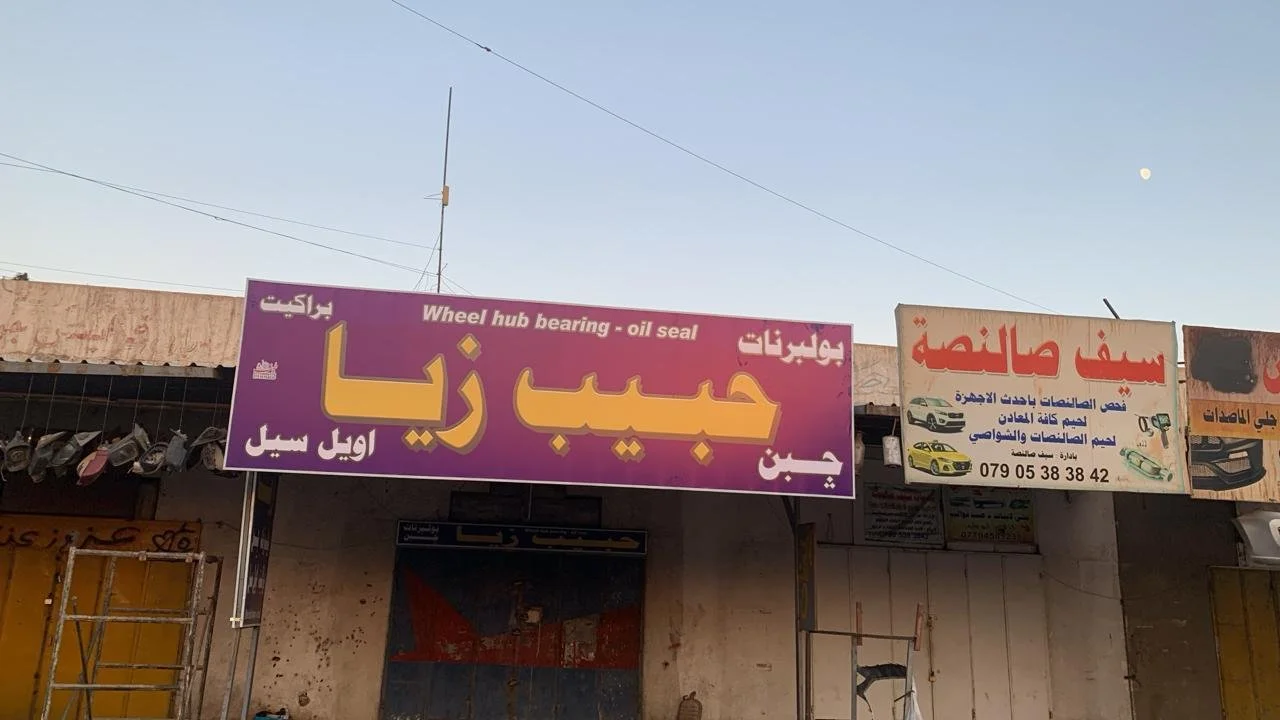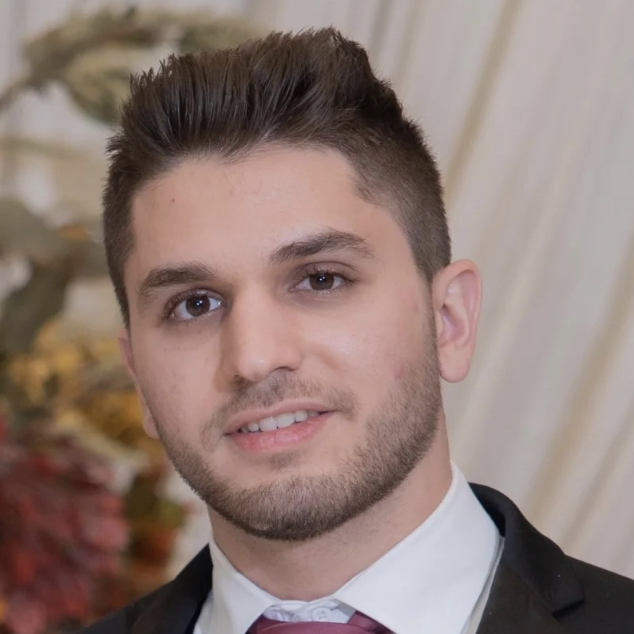From Baghdad to Big Law
Fady’s father’s auto parts shop. If you look closely at the walls, you’ll notice dozens of bullet holes. These are mostly from bullets fired by the US Army at nearby targets between 2003 and 2010.
Fadi Yatooma
An Immigrant’s Journey
By Fady Yatooma
I was born in December 2000, in Al Ghazaliya, a small neighborhood in Baghdad, only 15 miles away from the infamous Abu Ghraib prison complex where the U.S. Army and the CIA committed torture and other human rights abuses against prisoners.
One of my earliest memories from those days is the execution of Saddam Hussein. Being only five, I did not comprehend the event’s gravity nor implications for the country, but I remember turning to my dad and asking, “Why is this happening to our country?” That moment marked the first of many times I would ask this question.
Following Saddam’s execution, Baghdad degenerated into absolute hell on earth, becoming the most dangerous city in the world and spurring a mass exodus among Chaldeans, including my extended family and sister. Al Ghazaliya became an epicenter of the insurgency against the U.S. military and a battlefield for the sectarian war between Sunnis and Shiites that slowly engulfed Iraq.
The escalating violence forced my mother to wear a hijab when taking me to school, but soon even that wasn’t enough—our neighbor had to join us, often covering our eyes to shield us from the sight of corpses abandoned next to garbage on the roadside. I later discovered that anyone attempting to bury the dead would be targeted and deemed a sympathizer by the perpetrating militia. As Sunni militias forced nearly every Chaldean and Shiite from their homes, my family preemptively relocated before a death threat could be issued against us.
In 2008, my family relocated to Palestine Street, a Shia-majority neighborhood where my late grandfather lived and owned a house. Despite Baghdad’s instability and dangers, my dad continued operating his auto-parts shop in a Sunni neighborhood. His goal was to stay in Iraq absent a direct threat to our lives.
In 2010, the Islamic State of Iraq (ISI) began targeting Chaldeans, bombing churches (including Sayedat al-Najat), and massacring dozens of worshippers. Two weeks later, my family fled to Lebanon and sought asylum via the United Nations (UN).
Refugees in Lebanon
In my second month of fifth grade, we arrived in Lebanon. Having already transferred schools twice in Baghdad for safety, Central College of Jounieh (CCJ) became my third elementary school that year. Unlike my transfers in Baghdad, this move was accompanied by serious cultural, academic, and social challenges that changed my priorities and worldview.
First, the Lebanese education system offers most subjects in either English or French, and Arabic is reserved for only a few courses. Choosing to learn STEM courses in English still required learning French as a third language. At the time, I only knew Modern Standard Arabic (MSA) and the Iraqi dialect. As a fifth-grade refugee, I was expected to learn English, French, and the Lebanese dialect overnight to have a chance at passing my classes.
The first few weeks at school were humiliating and debilitating. I was the worst student in my class for the first time, my classmates mocked the way I spoke, and my only friend was another Iraqi student. Every day, I told my parents I wanted to give up. I could not understand any class materials or adapt to Lebanese culture. But I was so fortunate that my parents believed in me more than I did in myself. They invested their scarce resources in private tutoring and soccer training to keep me motivated.
By sixth grade, I joined the school’s soccer team, made new friends, and significantly improved my GPA. I had renewed confidence, and by the end of my time in Lebanon, I was among the top five students in my class, had many friends, and had won over 10 soccer tournaments. After 32 months there, we were granted asylum and prepared to start over in Michigan.
Academic Journey in the US
In the summer of 2013, my family was reunited in Michigan. At first, I struggled to adapt to the culture, but soon after, I performed well academically and quickly developed strong connections within the Chaldean community. Throughout these experiences, the question I asked my dad when I was five still lingered in my mind, and witnessing the political and economic systems of Iraq, Lebanon, and the United States drove my search for answers.
Learning about the structure and founding ideals of the American political system in high school convinced me that America’s political and legal systems are the key to the country’s success. This epiphany inspired me to closely follow domestic and international news, hoping to vindicate my hypothesis. I became passionate about U.S. politics and media and wanted to follow in the footsteps of successful figures in this realm by attending a top-tier law school.
Upon graduating high school, I attended Oakland University (OU) and earned a B.S. in public policy and administration, maintaining a 3.99 GPA. To have a real chance at Harvard, Yale, or Stanford, the top three law schools in the country, I knew I had to excel on the Law School Admission Test (LSAT), despite my history of poor standardized test performance. I believed the LSAT was the primary barrier keeping me from a successful legal/political career, so I dedicated myself fully to scoring well enough to get into one of the top law schools.
Although I received encouragement and support, many advised me to “keep my goals realistic” because top schools rarely accept those with my background. I always responded, “There may not be anyone there with my background, but it’s because they have not tried hard enough.” After three months of LSAT preparation, I scored 166 out of 180 (91st percentile) on my first LSAT attempt. It was my best standardized score but still below the medians of Harvard, Yale, and Stanford.
Confident in my ability to improve, I decided to master every concept before retaking the exam. To integrate LSAT concepts into my daily life, I founded LSAT Mastery, LLC, offering affordable tutoring services and courses. I taught the LSAT and worked on my weaknesses for over a year before retaking the exam in October 2021, scoring a 179 out of 180 (99th percentile). This result transformed my life, my family’s life, and inspired many young Chaldeans to maximize their academic potential.
A year later, I was admitted to Yale Law School, the top law school for the past three decades. The moment I had dreamt of and lost much sleep over finally became a reality. I certainly could not have done it without everyone’s support. I quickly accepted the offer and began planning my legal career, navigating the process with little guidance. Today, I have completed my first year at Yale Law and am currently interning at Latham & Watkins as a summer associate.
Every single day, with no exceptions, I walk into a building at Yale or Latham and wonder: “How did I end up here from Baghdad?”
LSATlgmastery.com offers free resources including LSAT lectures on YouTube, a digital library, LSAT courses, and consultation on applying for the LSAT. There is also a Facebook group with over 4,000 members.


